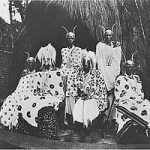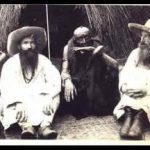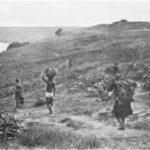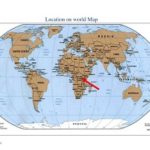The Nuclear Feudal Cluster
It has been seen in the preceding chapter on social organization that the chieftain is the head of a group which is called the “nuclear feudal cluster.” By the author’s definition, this is the smallest socio-political group of the hierarchy. In this text, unless otherwise specified, the nuclear feudal cluster will refer to the chieftain as patron, surrounded by all of his clients, Tutsi and Hutu, bound to him in fealty. In further explanation of the term,it must be pointed out that “nuclear” is used because it best describes the basic group in the hierarchical social organization of Ruanda, in the same way that a nuclear family is the basic group in the make-up of lineages. The nuclear group is then qualified as “feudal” because of the nature of the relationship between patron and client. Bonds of fealty and commendation unite its members. From these bonds come various benefices and privileges that do not necessarily extend outside the group. Finally, it is called a “cluster” because of the bonding idea that is part of the concept. A word that implies “structure” would be preferable; “family” is such a word, but it is felt that a radical departure from any aspect of kinship would best convey the idea of a structure which, although born out of the kinship structure, is identical to it in form but separate from it in substance, and different in extent.
It must be kept in mind that the nuclear feudal cluster may be formed around a patron who is not a chief or a chieftain. A politically powerful Tutsi may have even more clients than the chieftain of the Hill upon which he has an igikingi. Poor Tutsi might well have no clients, while some rich Hutu might have clients of their own.
Some of the privileges (understood in the feudal sense), dispensed by the chieftain within the nuclear feudal cluster involve land, pasture rights (igikingi), and corvée labor (uburetwa). The recipient considers these privileges as his amarembo.
Amarembo (sing. irembo). — The original sense of the word is “gateway” into the rugo. This sense was extended to the “giving of an irembo” (gutanga irembo), by the Mwami. The sense is figurative; it is itself an extension in meaning from an actual situation, i.e., the Mwami customarily placed someone at the entrance (irembo) of his rugo and anyone wishing to obtain an audience with the Mwami had to come through the irembo. This person had the privilege of levying “gifts” from those who approached him to gain access to the Mwami. The meaning of theword probably extended from this to include any feudal rights over certain things, i.e., rights which are distributed as privileges and benefits.
Amaremborights could be called fiefs in the sense that “money, houses, wheat, oats, .and even hall the bees which might be found in a particular forest”were infeudated at the end of the twelfth century in Europe. But the word corresponds still more closely with the Japanese shikiof the eighth century, in which shikirights could be those of ownership of land, or of cultivating the same, or of the produce thereof, or of part of the produce thereof, etc.An irembo in Remera therefore may be the right of way through somebody else’s land fief, or it might be the right of a patron over all of the cows in the hands of his clients, or it can refer to the right of a Tutsi to pasture his cows on the sorghum stubble (igisigati) grown by certain households. It is also in this sense that a patron’s cow herder may have the use of some of the milk of the herd’s cows. The cows are then referred to as inyarembo.
Igikingi (pl. ibikingi). – A Tutsi arriving on a new Hill usually starts to pay court to the chieftain by giving him a cow. The chieftain, in turn, provides the new-arrival with amaremboover a certain number of households. These households are included in a geographic area which is called, as a whole, igikingi. It seems that the rights of a Tutsi over these households are limited to igisigati(rights to pasture his cows on sorghum stubble) during the dry season. Igikingi does not – and this seems to mark an important difference between Eastern and Central Ruanda – define the rights of disposing indiscriminately of these households’ land for pasture. There is enough pasture for all in Remera.
However, it is highly probable that the richer and more powerful Tutsi of the Hill receive from the chieftain, as additionalirembo, the right to distribute unused agricultural lands within his igikingi – a right usually reserved to the chieftain. This seems tobe confirmed by the fact that there is at least one court case,in winch a rich Tutsi seems to think he has the right to allow, or not to allow, someone to establish himself on the unoccupied parts of his igikingi. In such acase he also has the right to claim the corvée work and dues that go along with the additional irembo. It seems also to give him the right – which appears to contradict the rights of lineages on land holdings – to seize any land that he might have “given” his clients.
Ibikingi were abolished in 1929 by the administration. The reality of ibikingi died slowly among the people, but by the time of investigation (1960-61), their disappearance had been accepted.
Uburetwa and ibihunikwa. Another privilege which is theoretically only that of the chieftain, but which he can, in fact, pass on to his clients is that of uburetwa, i.e., corvée labor. An instance of this transference of privilege occurred sometime between 1932 and 1942, when a Hutu peasant on Remera became umuretwa (a man who gives corvée labor), to a Tutsi widow. The chieftain, as chieftain, had given her the uburetwa of this man. As stated above, uburetwa was not abolished officially until 1949.
Such may have been the case with dues in kind (ibihunikwa) paid to the chieftain, i.e., he might have been able to transfer the reception of this privilege also, but nothing is known of this regarding Remera.
https://uk.amateka.net/the-nuclear-feudal-cluster/https://uk.amateka.net/wp-content/uploads/2021/05/abakera.jpghttps://uk.amateka.net/wp-content/uploads/2021/05/abakera-150x150.jpgModel CitizenshipIt has been seen in the preceding chapter on social organization that the chieftain is the head of a group which is called the 'nuclear feudal cluster.' By the author's definition, this is the smallest socio-political group of the hierarchy. In this text, unless otherwise specified, the nuclear feudal...BarataBarata rpierre@ikaze.netAdministratorAMATEKA | HISTORY OF RWANDA




